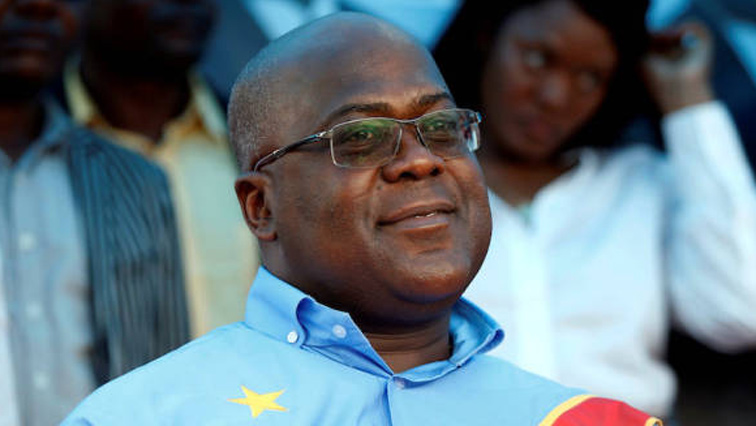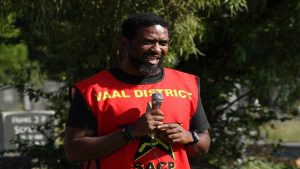Felix Tshisekedi is to be sworn in on Thursday as president of Democratic Republic of Congo, marking the country’s first-ever peaceful handover of power after chaotic and bitterly-disputed elections.
At 55, opposition leader Tshisekedi takes over from Joseph Kabila who is stepping aside after 18 years at the helm of sub-Saharan Africa’s biggest country.
The inauguration will take place at the Palace of the Nation, the seat of the presidency, at noon (1100 GMT), aides to Tshisekedi and Kabila said on Wednesday.
One of Tshisekedi’s first tasks will be to appoint a prime minister in a move which will see him sharing power with Kabila’s supporters, who hold an overwhelming majority in parliament.
The ceremony caps more than two years of turmoil sparked by Kabila’s refusal to step down when he reached the constitutional limit on his term in office.
– Turbulence –
A country the size of continental western Europe, DR Congo has lived through two regional wars in 1996-97 and 1998-2003.
The last two presidential elections, in 2006 and 2011 — both of which were won by Kabila — were marred by bloody clashes.
The ballot, which took place on December 30 after being delayed three times, surprised many by the lack of violence, but a political storm swiftly brewed over the count.
Tshisekedi was declared winner with 38.5 percent of the vote, over his opposition rival Martin Fayulu, who was credited with 34.8 percent.
Fayulu branded the result a fix but lost a challenge to the Constitutional Court and foreign support for his position ebbed as countries took comfort in a peaceful transition.
“The opposition has run out of recourse to challenge the election results and the threat of widespread post-election violence is gradually subsiding,” said Robert Besseling of EXX Africa, a business risk consultancy.
– Many challenges –
Tshisekedi heads the Union for Democracy and Social Progress (UDPS), DR Congo’s oldest and largest opposition party, which was founded and led by his father Etienne.
Analysts say he faces a raft of pressing problems after taking the oath of office.
He must defuse the anger of Fayulu’s supporters, carry out his campaign pledge of ending the “gangrene” of corruption after the Kabila era, and forge a power-sharing arrangement with the outgoing president’s bloc.
The pro-Kabila Joint Front for Congo (FCC), controls 337 seats in the 500-member National Assembly against 102 for Fayulu’s coalition, Lamuka, and 46 for his own coalition, Heading for Change (Cach).
“Tshisekedi will have little margin for manoeuvre,” said Stephanie Wolters at South Africa’s Institute for Security Studies (ISS) think tank.
According to a “political coalition agreement” seen by AFP which outlines an arrangement for “power-sharing” between the FCC and Cach, the position of prime minister “will be rotated every five years.”
And the defence, foreign affairs and interior portfolios will go to “the president’s political family”.
Kabila himself will become a senator for life, a position reserved for outgoing presidents under the constitution, but he is widely expected to wield influence through his supporters.
His family has acquired a wide range of assets during the many years in power.
Kabila congratulated Tshisekedi on the eve of his inauguration, saying he will hand over power to his successor “without regret or remorse”.
In his first speech since the election, Kabila said Tshisekedi can count on him “whenever he wants” and called for a “grand coalition of all the progressive forces”.
“A coalition against the predatory forces that have come together and will always try to join forces to monopolise our natural resources,” he said.
– Conflict and poverty –
Beyond the politics, Tsishekedi also has to deal with the brutal militias who control parts of the country’s strife-torn east where an Ebola epidemic is also unfolding.
He also has to meet the expectations of his supporters about easing poverty, which afflicts the vast majority of the country’s 80 million citizens.
Despite the poverty, DR Congo boasts a treasure trove of minerals, ranging from gold and diamonds to copper and coltan — a mineral essential for the batteries used in hand-held electronic devices.
Yet, in a country where graft is entrenched, very little of the wealth trickles down to the poor. It ranks a mere 176th on the 189-nation Human Development Index compiled by the United Nations’ Development Programme (UNDP).
DR Congo’s disputed presidential election
Felix Tshisekedi will be sworn in as the Democratic Republic of Congo’s new president Thursday after an election fraught with delays and doubts.
Here is a recap.
– Two-year delay –
After being postponed three times, the elections go ahead on December 30, 2018 to chose a successor to President Joseph Kabila.
His term ran out in late 2016 and his extended stay in power had resulted in demonstrations and criticism.
The election is held in relative calm although clashes claim four lives in the volatile eastern South-Kivu province.
Voting is delayed until March 2019 in two regions affected by unrest and Ebola.
– Tensions –
On December 31 the influential Catholic bishops conference says its observers had signalled anomalies in the vote count.
On January 2, with tensions growing, Kinshasa pulls the accreditation of a French radio journalist and halts broadcasts of the popular Radio France Internationale (RFI).
– Surprise result –
After a long delay the electoral commission issues provisional results in the early hours of January 10, declaring that opposition candidate Felix Tshisekedi won with 38.57 percent.
Pre-vote favourite, the opposition’s Martin Fayulu, took 34.8 percent, it says.
Kabila’s chosen successor, Emmanuel Ramazani Shadary, has 23.8 percent.
Fayulu immediately denounces an “electoral coup”.
– Results disputed –
France queries the result and the United States calls for “clarification”. The Catholic Church says it does not tally with its own data.
On January 11 a curfew is declared in Kikwit, Fayulu’s bastion in the west, where at least nine people are killed in protests.
– Towards co-habitation –
Legislative election results are announced on January 12 giving pro-Kabila parties a majority in the national assembly.
It means that Tshisekedi’s prime minister will come from Kabila’s camp.
– Court challenge –
Fayulu lodges an appeal on January 12 in the Constitutional Court against the presidential vote results.
The following day the Southern African Development Community (SADC) regional bloc urges a recount.
On January 15 documents leaked to foreign media — including the Financial Times, TV5 Monde and RFI — back Fayulu’s claim to be the winner.
– Tshisekedi confirmed –
On January 18 the DR Congo rebukes the African Union for expressing “serious doubts” over the provisional result, saying the Constitutional Court — considering Fayulu’s appeal — is impartial.
The court on January 20 dismisses the appeal and confirms Tshisekedi as winner.
Fayulu calls on the international community to reject Tshisekedi’s victory.
– Doubts, recognition –
The same day SADC congratulates Tshisekedi and calls for a peaceful handover of power.
The EU says that “doubts remain”.
After talks in Brussels, the AU and EU signal on January 22 their willingness to accept Tshisekedi as winner and to work with him as president.






